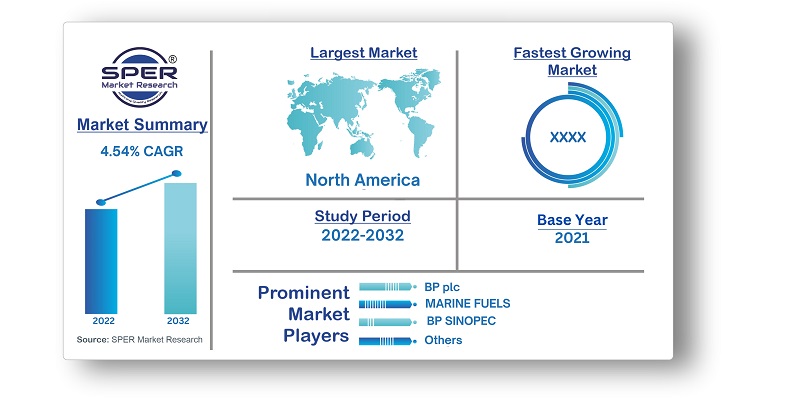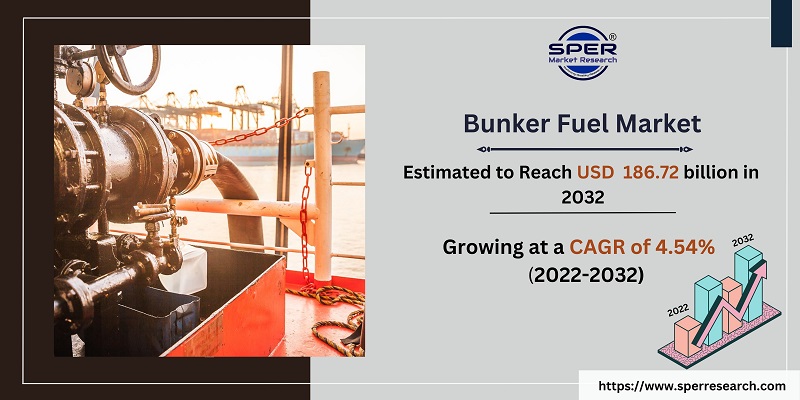
Bunker Fuel Market Growth, Share, Price, Revenue, Demand, Opportunities and Future Trends 2032
Bunker Fuel Market Size- By Applications, By Commercial Distributors, By End Users, By Fuel Grades- Regional Outlook, Competitive Strategies and Segment Forecast to 2032
| Published: Feb-2023 | Report ID: POAE2318 | Pages: 1 - 222 | Formats*: |
| Category : Power & Energy | |||


| Report Metric | Details |
| Market size available for years | 2019-2032 |
| Base year considered | 2021 |
| Forecast period | 2022-2032 |
| Segments covered | By Application, By Commercial Distributors, By End Users, By Fuel Grades |
| Regions covered | Asia-Pacific, Europe, Middle East and Africa, North America, Latin America |
| Companies Covered | BP plc., BP SINOPEC , MARINE FUELS, Brightoil Petroleum (Holdings) Limited, Chemoil Energy Limited, Chevron Corporation, China Petrochemical Corporation, Exxon Mobil Corporation, Gazprom Neft PJSC, Lukoil-Bunker LLC, Marathon Petroleum Corporation, Minerva Bunkering, Neste, Petróleos Mexicanos, Petroliam Nasional Berhad (PETRONAS),Royal Dutch Shell PLC, Sinopec Group, Total SE |
- Bunker fuel suppliers and distributors
- Shipping companies and vessel owners
- Oil and gas companies
- Government agencies and regulatory bodies
- Research and consulting firms
- Investors and financial institutions
- Environmental organizations and NGOs
- Port authorities and terminal operators
- Energy and commodity traders
- Maritime industry associations and trade unions
- Bulk Carrier
- Chemical Tanker
- Container
- Fishing Vessels
- Gas Tanker
- General Cargo
- Oil Tanker
- Large Independent Distributor
- Oil Majors
- Small Independent Distributor
- Bulk Carrier
- Container
- Oil Tanker
- IFO 380
- IFO 180
- IFO others
- MGO/MDO
- Asia-Pacific
- Europe
- Middle East & Africa
- North America
- Latin America
- Size of Global Bunker Fuel Market (FY’2019-FY’2032)
- Overview of Global Bunker Fuel Market
- Segmentation of Global Bunker Fuel Market By Application (Bulk Carrier, Chemical Tanker, Container, Fishing Vessels, Gas Tanker, General Cargo, Oil Tanker, Others)
- Segmentation of Global Bunker Fuel Market By Commercial Distributors (Large Independent Distributor, Oil Majors, Small Independent Distributor)
- Segmentation of Global Bunker Fuel Market By End Users (Bulk Carrier, Container, Oil Tanker, Others)
- Segmentation of Global Bunker Fuel Market By Fuel Grades (IFO 380, IFO 180 ,IFO others , MGO/MDO)
- Statistical Snap of Global Bunker Fuel Market
- Growth Analysis of Global Bunker Fuel Market
- Problems and Challenges in Global Bunker Fuel Market
- Competitive Landscape in the Global Bunker Fuel Market
- Impact of COVID-19 and Demonetization on Global Bunker Fuel Market
- Details on Recent Investment in Global Bunker Fuel Market
- Competitive Analysis of Global Bunker Fuel Market
- Major Players in the Global Bunker Fuel Market
- SWOT Analysis of Global Bunker Fuel Market
- Global Bunker Fuel Market Future Outlook and Projections (FY’2019-FY’2032)
- Recommendations from Analyst
1.1. Scope of the report1.2. Market segment analysis
2.1 Research data source2.1.1 Secondary data2.1.2 Primary data2.1.3 SPER’s internal database2.1.4 Premium insight from KOL’s2.2 Market size estimation2.2.1 Top-down and Bottom-up approach2.3 Data triangulation
4.1. Driver, Restraint, Opportunity and Challenges analysis4.1.1 Drivers4.1.2 Restraints4.1.3 Opportunities4.1.4 Challenges4.2. COVID-19 Impacts of the Global Bunker Fuel Market
5.1. SWOT analysis5.1.1 Strengths5.1.2 Weaknesses5.1.3 Opportunities5.1.4 Threats5.2. PESTEL analysis5.2.1 Political landscape5.2.2 Economic landscape5.2.3 Social landscape5.2.4 Technological landscape5.2.5 Environmental landscape5.2.6 Legal landscape5.3. PORTER’S five forces analysis5.3.1 Bargaining power of suppliers5.3.2 Bargaining power of Buyers5.3.3 Threat of Substitute5.3.4 Threat of new entrant5.3.5 Competitive rivalry5.4. Heat map analysis
6.1 Global Bunker Fuel Market Manufacturing Base Distribution, Sales Area, Product Type6.2 Mergers & Acquisitions, Partnerships, Product Launch, and Collaboration in Global Bunker Fuel Market
7.1 Bulk Carrier7.2 Chemical Tanker7.3 Container7.4 Fishing Vessels7.5 Gas Tanker7.6 General Cargo7.7 Oil Tanker7.8 Others
8.1 Large Independent Distributor8.2 Oil Majors8.3 Small Independent Distributor
9.1 Bulk Carrier9.2 Container9.3 Oil Tanker9.4 Others
10.1 IFO 38010.2 IFO 18010.3 IFO others10.4 MGO/MDO
11.1 Global Bunker Fuel Market Size and Market Share by Region (2019-2025)11.2 Global Bunker Fuel Market Size and Market Share by Region (2026-2032)11.3 Asia-Pacific11.3.1 Australia11.3.2 China11.3.3 India11.3.4 Japan11.3.5 South Korea11.3.6 Rest of Asia-Pacific11.4 Europe11.4.1 France11.4.2 Germany11.4.3 Italy11.4.4 Spain11.4.5 United Kingdom11.4.6 Rest of Europe11.5 Middle East and Africa11.5.1 Kingdom of Saudi Arabia11.5.2 United Arab Emirates11.5.3 Rest of Middle East & Africa11.6 North America11.6.1 Canada11.6.2 Mexico11.6.3 United States11.7 Latin America11.7.1 Argentina11.7.2 Brazil11.7.3 Rest of Latin America
12.1 BP plc.
12.1.1 Company details12.1.2 Financial outlook12.1.3 Product summary12.1.4 Recent developments12.2 BP SINOPEC MARINE FUELS12.2.1 Company details12.2.2 Financial outlook12.2.3 Product summary
12.2.4 Recent developments
12.3 Brightoil Petroleum (Holdings) Limited12.3.1 Company details12.3.2 Financial outlook12.3.3 Product summary
12.3.4 Recent developments
12.4 Chemoil Energy Limited12.4.1 Company details12.4.2 Financial outlook12.4.3 Product summary12.4.4 Recent developments12.5 Chevron Corporation12.5.1 Company details12.5.2 Financial outlook12.5.3 Product summary12.5.4 Recent developments12.6 China Petrochemical Corporation12.6.1 Company details12.6.2 Financial outlook12.6.3 Product summary12.6.4 Recent developments12.7 Exxon Mobil Corporation12.7.1 Company details12.7.2 Financial outlook12.7.3 Product summary12.7.4 Recent developments12.8 Gazprom Neft PJSC12.8.1 Company details12.8.2 Financial outlook12.8.3 Product summary12.8.4 Recent developments12.9 Lukoil-Bunker LLC12.9.1 Company details12.9.2 Financial outlook12.9.3 Product summary12.9.4 Recent developments12.10 Marathon Petroleum Corporation12.10.1 Company details12.10.2 Financial outlook12.10.3 Product summary12.10.4 Recent developments12.11 Minerva Bunkering12.11.1 Company details12.11.2 Financial outlook12.11.3 Product summary12.11.4 Recent developments12.12 Neste12.12.1 Company details12.12.2 Financial outlook12.12.3 Product summary12.12.4 Recent developments12.13 Petróleos Mexicanos12.13.1 Company details12.13.2 Financial outlook12.13.3 Product summary12.13.4 Recent developments12.14 Petroliam Nasional Berhad (PETRONAS)12.14.1 Company details12.14.2 Financial outlook12.14.3 Product summary12.14.4 Recent developments12.15 Royal Dutch Shell PLC12.15.1 Company details12.15.2 Financial outlook12.15.3 Product summary12.15.4 Recent developments12.16 Sinopec Group12.16.1 Company details12.16.2 Financial outlook12.16.3 Product summary12.16.4 Recent developments12.17 Total SE12.17.1 Company details12.17.2 Financial outlook12.17.3 Product summary12.17.4 Recent developments
SPER Market Research’s methodology uses great emphasis on primary research to ensure that the market intelligence insights are up to date, reliable and accurate. Primary interviews are done with players involved in each phase of a supply chain to analyze the market forecasting. The secondary research method is used to help you fully understand how the future markets and the spending patterns look likes.
The report is based on in-depth qualitative and quantitative analysis of the Product Market. The quantitative analysis involves the application of various projection and sampling techniques. The qualitative analysis involves primary interviews, surveys, and vendor briefings. The data gathered as a result of these processes are validated through experts opinion. Our research methodology entails an ideal mixture of primary and secondary initiatives.



Frequently Asked Questions About This Report
PLACE AN ORDER
Year End Discount
Sample Report
Pre-Purchase Inquiry
NEED CUSTOMIZATION?
Request CustomizationCALL OR EMAIL US
100% Secure Payment






Related Reports
Our Global Clients
Our data-driven insights have influenced the strategy of 200+ reputed companies across the globe.






















